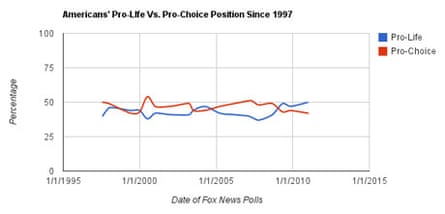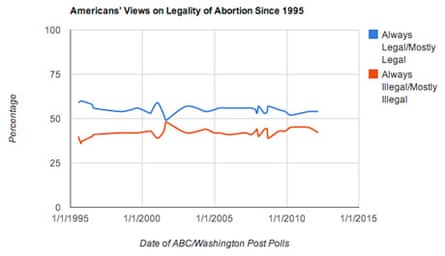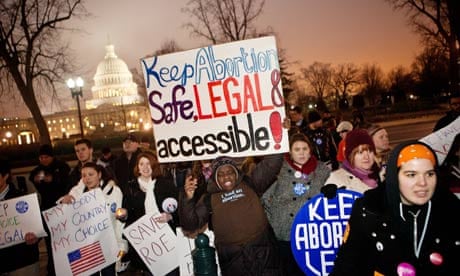There probably isn't a more contentious social issue than abortion. In past decades and present, women have died from backroom abortions, abortion doctors have been killed because of their profession, while those against abortion would argue that hundreds of thousands of fetuses have been "murdered".
Distinct from most "social rights" movements of the mid 20th century, public opinion on abortion has not shifted dramatically in the direction of the progressive position. Anti-abortion advocates are continually trying to pass restrictions on abortion, such as requiring ultrasounds before an abortion. They are also hopeful that one day the US supreme court will overturn Roe v Wade.
Gallup released a poll this week ostensibly affirming the optimism of those opposed to abortion. A record low 41% of Americans now consider themselves to be "pro-choice", since Gallup started asking the question in 1995. A near-record high 50% of Americans are now "pro-life". You might think by these percentages that we're entering a new era on the abortion rights front. But you'd be mistaken.
The pro-life/pro-choice wording dichotomy leads to some funky and inconsistent responses from Americans. Take a look at the chart Gallup provides on their question about pro-life v pro-choice.
The pro-life/pro-choice positions follow no real pattern. More Americans were "pro-choice" in the late 90s. The two positions tied around 2001. Pro-choice took a lead throughout most of the 2000s. Pro-life then led in 2009. Pro-choice retook the lead in 2011. Pro-life has gained the advantage this year.
This bouncy behavior is also seen in Fox News/Opinion Dynamics polls that asked a similar pro-life/pro-choice question from 1997-2011.

Pro-choice is up one year; pro-life is up the next. In 2004, Fox found more Americans were pro-life than pro-choice, but Gallup found the opposite result. The next year, Fox's poll found pro-choice leading again. There's just no consistency to the data.
So what is going on here? I hypothesized in 2010 that it has to do with the pro-life/pro-choice question being vague. What happens when a person might be personally against abortion, but believes that it should be allowed legally? When Mitt Romney ran for office in Massachusetts, he repeatedly stated that while he was personally "pro-life", he would maintain abortion rights.
People who hold the same public/private difference in position as Romney used to might answer the question differently depending on their mindset at the time of the poll. If these types of people are thinking about their personal position, they will answer "pro-life". If they are thinking about public policy positions, they will probably answer "pro-choice".
There are far more proper ways to understand the public's position on abortion rights. Right now, Roe v Wade is the law of the land. That's the underpinning of abortion rights in this country. If Americans were really turning against abortion rights, then they should be turning against Roe v Wade. That's just isn't happening. Nate Silver investigated the issue back in 2009 and actually found a small trend toward growing support for the Roe v Wade decision over the previous decade.
A 2012 Quinnipiac poll affirms that there hasn't been any dramatic reversal in the past three years: 64% Americans agree with the Roe v Wade decision, while only 31% disagree.
Another way to ask the question is whether a person believes abortion should be legal or illegal. That gets at the heart of Mitt Romney's former conundrum. The ABC/Washington Post poll has been questioning Americans on whether they think abortion should be always legal, mostly legal, mostly illegal, or always illegal since 1995.

Compare this consistency to the wild swings of Fox's pro-choice, pro-life question.
More Americans always support the "legal" than "illegal" position on abortion, contra what the Fox and aforementioned Gallup polls might lead you to believe. Only once in the early 2000s did agreement with the illegal position even approach the legal position. That should be expected as one out of 20 polls should, theoretically, fall outside the margin of error.
The latest ABC/Washington Post poll in March found that 54% of Americans believe abortion should always or mostly be legal, while 43% said it should be always or mostly be illegal. That's the same level that abortion rights support has been at for the past 17 years. There has been no rapid shift in Americans' thinking.
Of course, that's not to say anti-abortion advocates are destined for failure. This supreme court conceivably may strike down Roe v Wade at some point. The public, however, would not be in agreement with such a ruling. They want abortion rights and they want Roe v Wade to be the law of the land.
